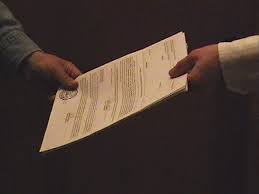 Getting served with papers is rarely an event someone meets with great joy or excitement. You mean I’m being sued for tax evasion? That’s awesome! Not words any process server will ever hear.
Getting served with papers is rarely an event someone meets with great joy or excitement. You mean I’m being sued for tax evasion? That’s awesome! Not words any process server will ever hear.
Getting served papers, while often upsetting and stressful, simply means that you are being informed – with a big stack of paperwork – that you are now involved in some sort of legal proceeding. That could mean being sued, going to divorce court, or anything in between. After the process server hands you your papers and you either yell, cry, kick a wall, or scratch your head in bewilderment, it’s important to know how to handle this newfound item on your to-do list.
First of all, don’t take your emotions out on the process server. He delivers bad news for a living, and it definitely is not his fault that you are tied up in legal proceedings. It’s possible he’ll even be called into court to testify, and if you physically or verbally assault him, those actions will hurt you in the eyes of the judge.
Secondly, write the date and time on the paperwork. This is very important because as of the day you are served, you are held to a specific response turn-around time. If you end up working with a lawyer or insurance company, they will want to track deadlines.
In addition – although this may seem obvious – read the papers! It’s all too tempting to throw bad news to the side. Out of sight, out of mind. But things will only get worse if you ignore your summons and complaint. The summons lets you know the details: response date, judge, and court on record. The complaint provides the details of the lawsuit.
If you were expecting – or dreading – this lawsuit, then you may already have an attorney in mind. If not, immediately work on finding an attorney with a strong reputation who can help you through the impending litigation. It might also be possible for insurance to assist in this claim if it’s related to personal injury or professional negligence. Reach out and see what help is available.
Though some people choose to handle matters themselves, without a strong legal background it’s generally not a good idea. The smartest thing to do after being served is to contact an attorney. He or she will help you navigate the remainder of the process.





